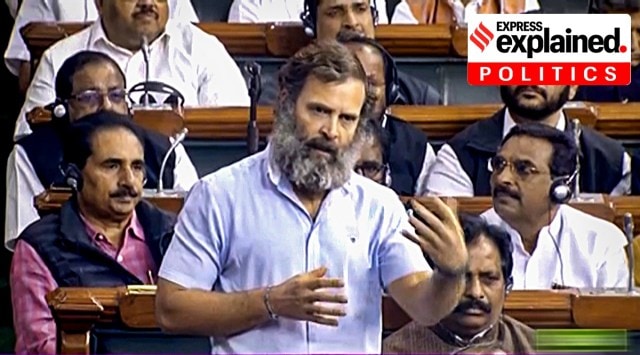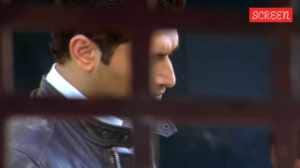The expunging of certain words, sentences, or portions of a speech from the records is fairly routine procedure, and is carried out in accordance with laid down rules.

The decision on which parts of the proceedings are to be expunged lies with the Presiding Officer of the House.
Story continues below this ad
What are the rules on expunging from the record?
Under Article 105(2) of the Constitution, “no Member of Parliament shall be liable to any proceedings in any court in respect of anything said…in Parliament or any committee thereof”. However, MPs don’t enjoy the freedom to say whatever they want inside the House.
The speech of MPs is subject to the discipline of the Rules of Parliament, “good sense” of its Members, and the control of proceedings by the Speaker. These checks ensure that MPs cannot use “defamatory or indecent or undignified or unparliamentary words” inside the House.
Rule 380 (“Expunction”) of the Rules of Procedure and Conduct of Business in Lok Sabha says: “If the Speaker is of opinion that words have been used in debate which are defamatory or indecent or unparliamentary or undignified, the Speaker may, while exercising discretion order that such words be expunged from the proceedings of the House.”
Rule 381 says: “The portion of the proceedings of the House so expunged shall be marked by asterisks and an explanatory footnote shall be inserted in the proceedings as follows: ‘Expunged as ordered by the Chair’.”
Story continues below this ad
And what are “unparliamentary” expressions?
Over the years, a huge number of words, both in English and other Indian languages, have been found to be “unparliamentary” by the Presiding Officers — the Speaker of Lok Sabha and Chairperson of Rajya Sabha. These unparliamentary expressions are kept out of Parliament’s records.
The Lok Sabha Secretariat has brought out a bulky volume of ‘Unparliamentary Expressions’.This book contains words or expressions that would likely be considered rude or offensive in most cultures. But it also contains content that would appear to be fairly harmless and innocuous.
“At the time [the book was first compiled], references were taken from debates and phrases (that had been) declared unparliamentary by the pre-Independence Central Legislative Assembly, Constituent Assembly of India, the Provisional Parliament, the first to the tenth Lok Sabha and Rajya Sabha, state legislatures, and Commonwealth parliaments like that of the United Kingdom,” former Lok Sabha Secretary General G C Malhotra had told The Indian Express in 2012.
Malhotra was head of the editorial board of the 2004 edition of the book that ran into 900 pages. State legislatures too are guided mainly by the same book of unparliamentary expressions.
Story continues below this ad
“Depending upon rulings of the Presiding Officers, new words and phrases continue to be added to the list at regular intervals,” Malhotra said.
How is the decision to expunge a word (or portion of a speech) taken?
According to K Srinivasan, former director, Lok Sabha Secretariat, “If a member uses a word that could be unparliamentary or indecent and hurts the decorum or dignity of the House, the head of the reporting section sends it to the Speaker or the Presiding Officer citing relevant rules and precedence with a recommendation to expunge them.”
The Speaker has the discretion under Rule 380 to expunge the word or usage. Once the Speaker expunges the word or usage, it comes back to the reporting section which removes the word from the records and mentions in the proceedings as “expunged as ordered by the chair”.
At the end of the session, a compilation of words removed from the records, along with reasons, is sent to the Speaker’s office, Sansad TV, and the editorial service for information.
Story continues below this ad
The context in which a word or sentence is used is key to making the decision on whether to expunge, Srinivasan said. “The focus on expunging a remark is on the context. The context is important. We make it a point to remove the minimum number of words,” he said.
Srinivasan gave the example of the word “Godse”, which was expunged first in 1958 after a member equated Prime Minister Jawaharlal Nehru to Nathuram Godse, and then again in 1962 after another member equated Godse to Swami Vivekananda, but was taken off the list of unparliamentary words by Speaker Sumitra Mahajan in 2015.
“It is contextual,” Srinivasan said. “A member cannot praise Nathuram Godse, but he can say Godse assassinated Mahatma Gandhi.”
What happens after a word has been expunged?
Expunged portions of the proceedings cease to exist in the records of Parliament, and they can no longer be reported by media houses, even though they may have been heard during the live telecast of the proceedings.
Story continues below this ad
However, the proliferation of social media has introduced challenges in the watertight implementation of expunction orders.
“Once the live broadcast (of proceedings) started, whenever such (unparliamentary) words were spoken, they were removed, instead of being replaced; and on the audio files, such words were replaced with a beep,” Srinivasan said.
“It there was an unparliamentary expression that had not been noticed by the Speaker, we (officials) would inform the Chair, and then remove it from the records after getting an order from the Chair,” he said.







































